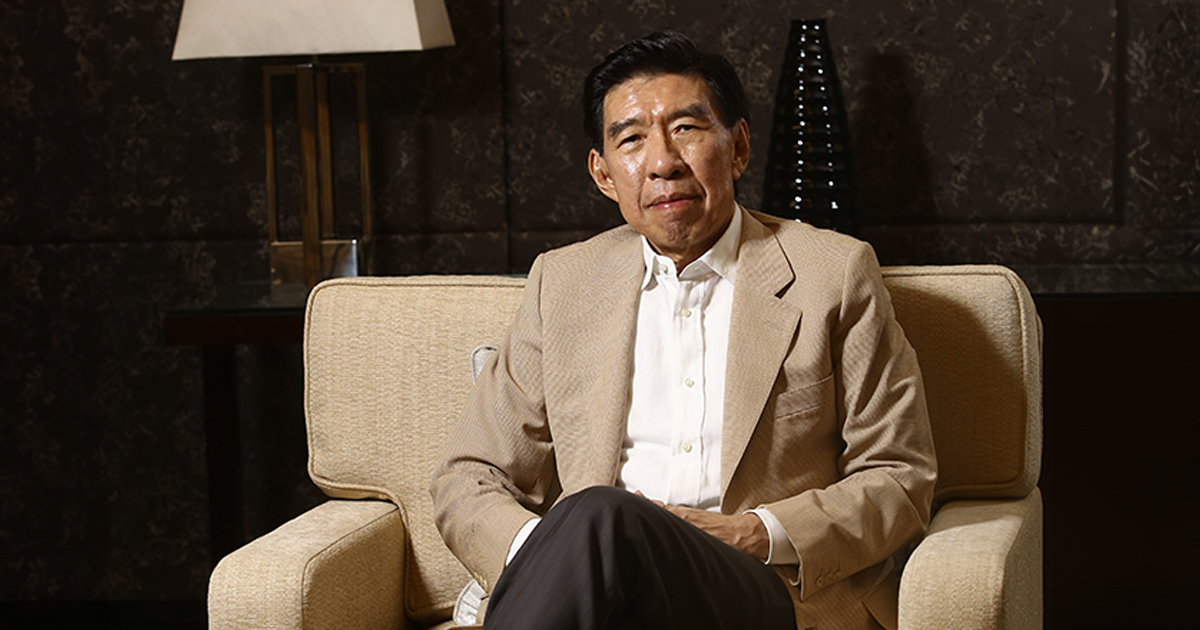Harry Susilo Shares Wisdom from Decades of Entrepreneurial Success

For Harry Susilo P’96, G’24 ’26, business is synonymous with family. As an entrepreneur for over 50 years, his career began as a fish seller when his father became ill. He later founded the Sekar Group of Companies in 1966 in Indonesia. Over five decades later, it remains a global, family business with over 20,000 employees and a leader in Indonesia’s food production and frozen food industries.
As for his connection to Babson, family is also a lynchpin. Susilo will receive an Honorary Doctor of Humane Letters at the College’s undergraduate Commencement ceremony, adding to his family’s Babson legacy. His daughter Finna Huang graduated from Babson in 1996, and two of Finna’s children are current students: Nolan Andrew Setiawan ’26 and Owen Matthew Setiawan ’24, who is graduating on May 11. Additionally, Babson’s Academy of Distinguished Entrepreneurs inducted Susilo in 2017.
“For me and my family, receiving an honorary degree represents recognition of our work and efforts,” Susilo says. “Especially as one of my grandchildren is about to graduate, this marks a significant milestone in his life. Over the years, I have shared my business principles with my family, emphasizing the importance of integrity, respect, and responsibility, with the belief that they will uphold these values in their future careers.”
The family component of business is a defining part of his legacy. Susilo is known globally for his commitment to the practice of ethical business, including the prioritization of benevolence, innovation, and integrity. He shares the perspective and wisdom he has passed down for generations.
An Entrepreneur Through the Decades
As the Sekar Group grew over half a century, Susilo witnessed the entrepreneurial landscape evolve along with it. These changes include rapid technological advancements and globalization alongside shifts in consumer behaviors and preferences. According to Susilo, such transformations can present entrepreneurs with new opportunities and challenges.
“The proliferation of digitalization and the internet has provided entrepreneurs with broader markets and more channels to promote and sell their products or services,” Susilo says. “Competition has also become fiercer due to globalization, allowing competitors worldwide to enter the same markets. Entrepreneurs must continuously innovate and adapt to stand out in competitive markets.”
Susilo stresses that a key to lasting success is the ability to adapt while staying true to your business ethos and objective. “The importance of staying true to one’s original aspirations is as essential as remembering the source of water,” he says.
“Entrepreneurial leadership primarily entails team building and motivation, rather than solely individual decision making. Entrepreneurs must inspire the potential of team members, encouraging them to work together toward common goals,” Harry Susilo P’96, G’24 ’26
Entrepreneurial leaders like Susilo are uniquely prepared to grow businesses beyond the monetary because they see problems as opportunities over setbacks and adopt a people-first mentality. Susilo sees integrity, transparency, and accountability as vital for entrepreneurs of all experience levels. Those three core principles help build strong reputations and credibility in the market while fostering a virtuous cycle for success.
“(These elements) all help foster a culture of integrity and trust within the broader professional community,” he says. “Businesses should make positive contributions to society, not just pursue profits.”
Entrepreneurial Leadership in Practice
A key component of entrepreneurial leadership is the ability to adapt to changes both in and outside your control. “Only by steadfastly upholding core values while remaining flexible to external changes can businesses navigate the fiercely competitive market, maintain a competitive edge, and achieve long-term success and sustained development,” Susilo adds.
That long-term success is achieved through honest and responsible business practices, as they add to more than just a bottom line. For Susilo, it ultimately comes back to that idea of teamwork and honoring your company’s history. He emphasizes that kindness and virtue cannot be overstated.
“Entrepreneurial leadership primarily entails team building and motivation, rather than solely individual decision making. Entrepreneurs must inspire the potential of team members, encouraging them to work together toward common goals,” he says. “Joining our group should first entail an understanding of our company’s history, as it is the soul and compass of our enterprise.”
Embracing a culture of kindness not only enhances the reputation of companies but also fosters long-term trust and loyalty among consumers and stakeholders. This requires leaders to possess strong communication skills, effective decision-making abilities, and understanding and support for team members. Ultimately, as Susilo’s legacy demonstrates, it’s imperative for entrepreneurial leaders of all kinds to pivot with confidence and integrity as they navigate industry shifts and demands for generations to come.
Posted in Community




